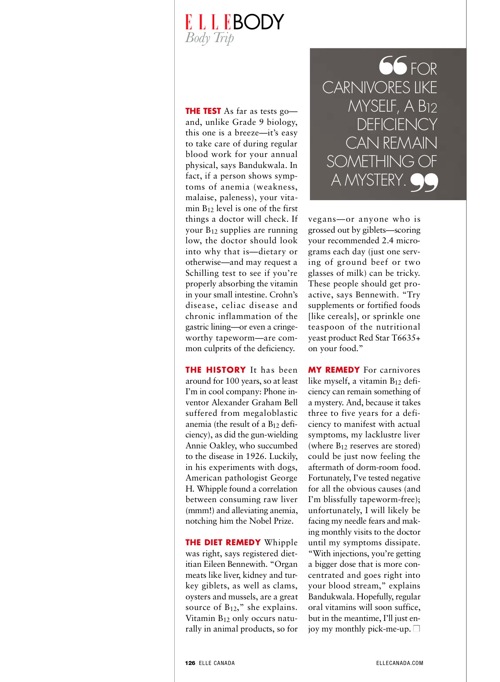The B12 Bop
Getting your groove back when all you really want is to sleep.
MY DILEMMA: It feels like a regular case of the winter blahs (tired, rundown, cranky) that I get once a month. But, no, it’s not what you’re thinking. I’m low on vitamin B12, the quiet accomplice of the better-known anemia. But a quick stop at my doc and one power shot to my upper arm and I’ll be riding a good-mood vitamin high for days. Madonna agrees with me: Rumour has it that the Material Girl shoots my drug of choice before every concert. But should you?
THE SCOOP: Water-soluble vitamin B12—the largest and most structurally complicated vitamin—does some serious multi-tasking in your bod. “It makes healthy red blood cells, helps out with DNA synthesis and regulates neurological functions,” says Dr. Farah Bandukwala, a physician in Hamilton, Ont. If your Grade 9 biology knowledge feels a little fuzzy, that could be your deficiency at work. “Basically, it’s everything your brain does: memory, mood, balance,” she says. Cutting-edge science has even linked a long-term B12 deficiency to dementia and Alzheimer’s disease.
THE TEST: As far as tests go—and, unlike Grade 9 biology, this one is a breeze—it’s easy to take care of during regular blood work for your annual physical, says Bandukwala. In fact, if a person shows symptoms of anemia (weakness, malaise, paleness), your vitamin B12 level is one of the first things a doctor will check. If your B12 supplies are running low, the doctor should look into why that is—dietary or otherwise—and may request a Schilling test to see if you’re properly absorbing the vitamin in your small intestine. Crohn’s disease, celiac disease and chronic inflammation of the gastric lining—or even a cringeworthy tapeworm—are common culprits of the deficiency.
THE HISTORY: It has been around for 100 years, so at least I’m in cool company: Phone inventor Alexander Graham Bell suffered from megaloblastic anemia (the result of a B12 deficiency), as did the gun-wielding Annie Oakley, who succumbed to the disease in 1926. Luckily, in his experiments with dogs, American pathologist George H. Whipple found a correlation between consuming raw liver (mmm!) and alleviating anemia, notching him the Nobel Prize.
THE DIET REMEDY: Whipple was right, says registered dietitian Eileen Bennewith. “Organ meats like liver, kidney and turkey giblets, as well as clams, oysters and mussels, are a great source of B12,” she explains. Vitamin B12 only occurs naturally in animal products, so for vegans—or anyone who is grossed out by giblets—scoring your recommended 2.4 micrograms each day (just one serving of ground beef or two glasses of milk) can be tricky. These people should get proactive, says Bennewith. “Try supplements or fortified foods [like cereals], or sprinkle one teaspoon of the nutritional yeast product Red Star T6635+ on your food.”
MY REMEDY: For carnivores like myself, a vitamin B12 deficiency can remain something of a mystery. And, because it takes three to five years for a deficiency to manifest with actual symptoms, my lacklustre liver (where B12 reserves are stored) could be just now feeling the aftermath of dorm-room food. Fortunately, I’ve tested negative for all the obvious causes (and I’m blissfully tapeworm-free); unfortunately, I will likely be facing my needle fears and making monthly visits to the doctor until my symptoms dissipate. “With injections, you’re getting a bigger dose that is more concentrated and goes right into your blood stream,” explains Bandukwala. Hopefully, regular oral vitamins will soon suffice, but in the meantime, I’ll just enjoy my monthly pick-me-up.

